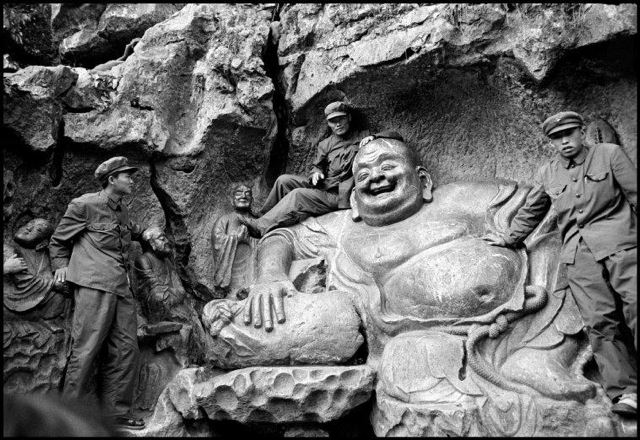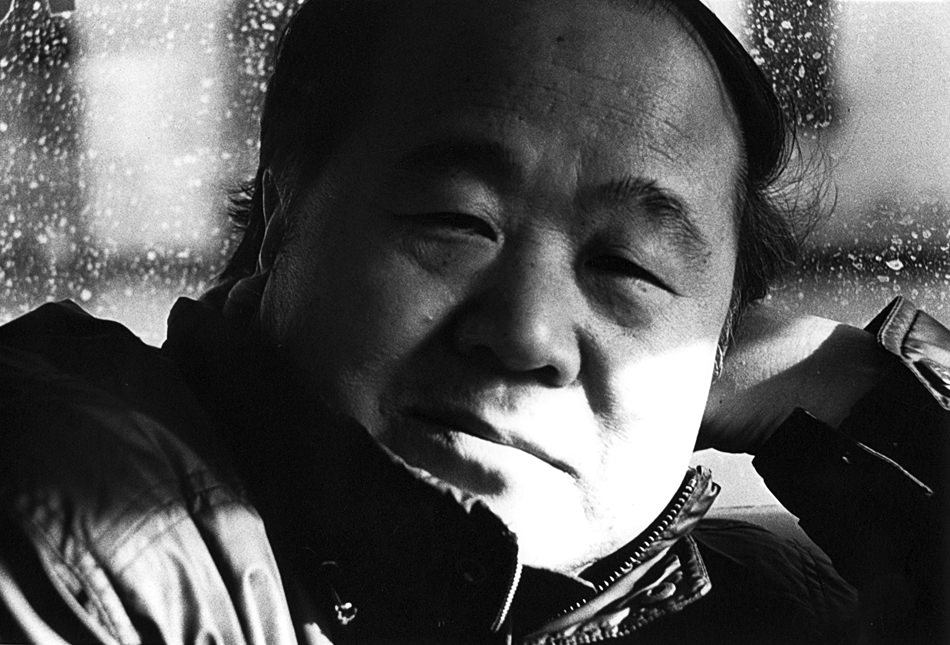Getting into the People’s Liberation Army was hard, but not as hard as getting into college. So, starting in 1973, I sent in my application and took a physical exam at the commune every year, and every year I was rejected. But then, in February 1976, with the help of some important people, my persistence paid off—I received my enlistment notice. Soon after that, on a cold, snowy day, I walked some fifteen miles to the county town. There I put on an army uniform and climbed into the back of a military truck for the trip to Huang County, where I moved into the famous “Ding Family Compound” barracks and began basic training. (I would not revisit the site until the fall of 1999, after Huang County had evolved into the city of Longkou and Ding Family Compound had been converted into a museum. What had originally impressed me as the magnificent home of a wealthy landlord I now saw was little more than a squat building, proof that my horizons had broadened.)
After getting through basic training, I was sent, along with three other recruits, to a so-called Intelligence Unit of the Ministry of Defense. People back home complimented me on my good luck of having been assigned to such a fine unit, but it actually turned out to be a major disappointment—it was only a radio-monitoring station that was about to be phased out.
The command to which we reported was in far off Beijing, so oversight was assigned to the 34th Brigade of the Penglai Garrison Command, stationed in Huang County, and charged with the responsibility of supervising our activities. Supervise! They did their best, but never really could supervise us nor did they dare to. Our unit designation was “263,” and any mention of “263” so depressed the commander of the 34th Brigade that his blood pressure would shoot up and his political commissar would simply roll his eyes. That tells you the sort of shitty unit I was assigned to.
When I wasn’t tilling the land I was on sentry duty, and the one thing that gave me a good feeling was the unit’s truck—just like the one Lu Wenli’s father had driven [in Mo Yan’s hometown]. Same model, same color, same age. Our driver was a short, grey-haired man with false teeth, a warrant officer in his forties named Zhang. We called him Technician Zhang. His second wife—he was divorced—lived and worked in the city of Jinan with their daughter, while the son he’d had with his first wife lived with him in camp, where they were both basketball fanatics. They were forever shooting hoops, and whoever missed the most shots had to crawl from midcourt to under the basket, pushing the ball along with his head. Soon after I arrived, it was always Technician Zhang who made his son do the crawling. A year later, it was the opposite. The boy, who had a strange name—Qinbing, or Soldier Boy—would whack his father’s raised rump with a stick as he crawled on the ground, each whack accompanied by a shout of “Faster!” His favourite comment was, “You’re like a bean sprout in a privy acting like a long-tailed maggot!”
I had no grand aspirations back then, since there were only a dozen or so men in my unit, which limited the chances to move up. So when I heard one of the veterans say that Technician Zhang was going to teach one of us recruits how to drive a truck, I hoped I’d be the one. Back in the village, I’d had to be content with watching wide-eyed as Lu Wenli’s father sped by in his Gaz 51, raising clouds of dust. I once got close to the truck, and it nearly cost me my life. Wenli’s father had parked on the street in front of the supply and marketing co-op to buy cigarettes. I leaped at the chance to get a feel of the truck by jumping onto the bumper and grabbing hold of the tailgate. When Wenli’s father came out with his cigarettes, he climbed into the cab and sped off, choking me with road dust. So I let go of the tailgate and was thrown to the ground like a dirt clod. I didn’t get right up, but when I did I had a swollen nose and bloody lips. I was sort of dazed, not quite sure how it had happened. I later figured it out: inertia.
But now I rode in a Gaz 51 every week, travelling the four or five miles to the farm. My unit had been given forty acres to farm. Nine of us were officers, who took turns on the creaky machine, which left seven guards to work the field. But two of the men, both from the city of Tianjin, were smooth talkers who didn’t do a lick of work. Who was left to do the actual work? I and four others.
Advertisement
Technician Zhang sped down the seaside gravel road to the farm, with either his son or one of the officers in the cab with him. We rode in the back, holding on to the sides, caps tucked firmly into our pants pockets, carefree and happy as our hair blew in the wind, and, as I thought back to the time I’d nearly died from wanting to see how fast the truck could go, I couldn’t help but congratulate myself on joining the army. Zhang drove like a madman. Cars and trucks were extremely rare back then, a time when the country could not boast of a single mile of highspeed highway. We were told that the Japanese had built our gravel road when they invaded China, and that it was considered one of the best in the country—a single lane each way, it was barely wide enough for two cars to pass. Cyclists we passed quickly disappeared into the cloud of dust we raised, and we were often treated to a volley of curses from behind us.
The locals had more backbone than the folks back home. No one had ever made trouble for Lu Wenli’s father if he ran over a village dog or chicken. But after Technician Zhang ran over a hen one day, the bird’s owner, an old woman, came and stood in the camp commander’s doorway, banging on the frame with her cane as she gave him hell. I later learned that she was the model for the glorified militia woman in the movie Mine Warfare. Both her sons were high-ranking officers in the PLA.
“You call yourself the Eighth Route Army!” she bellowed. “Not even the Japs acted like this when they came to the village!” Our camp leaders could not nod their agreement fast enough, bending at the waist and offering her ten yuan. “Ten yuan?” she sputtered, incredulous. “That hen laid an egg a day, with double yolks, as a matter of fact. That makes 365 eggs a year, all double-yoked. Five of them make one catty, at five-eighty a catty. What does that come to? Figure it out for yourselves.” What could the commander say? He sent her off with twenty yuan, hoping that was the end of it. But no, she’d barely left the barracks when she returned and demanded to see the driver of the truck that had run over her hen. “I want to see what kind of man,” she said through shriveled lips, “drives a run-down old truck like a rabbit trying to outrun a hunter’s bullet.” The commander could not deny her request, so he sent me to fetch Technician Zhang. He stood at attention and snapped off a smart-alecky salute.
“Revolutionary old mother,” he said, “I admit I was wrong!”
“That’s a start, but you have to change. From now on, keep it at fifteen miles an hour when you’re in the village. If you don’t, I’ll plant land mines in the road and blow you out of your skin, you bastard!”
Sometime later, I heard that the always-clever Technician Zhang paid a call on the old woman with a box of pastries, and even asked her to be his symbolic foster mother.
Mo Yan was awarded the Nobel Prize in Literature today. This text is excerpted from his part fiction, part memoir Change, translated from the Chinese by Howard Goldblatt and published by Seagull Books.



